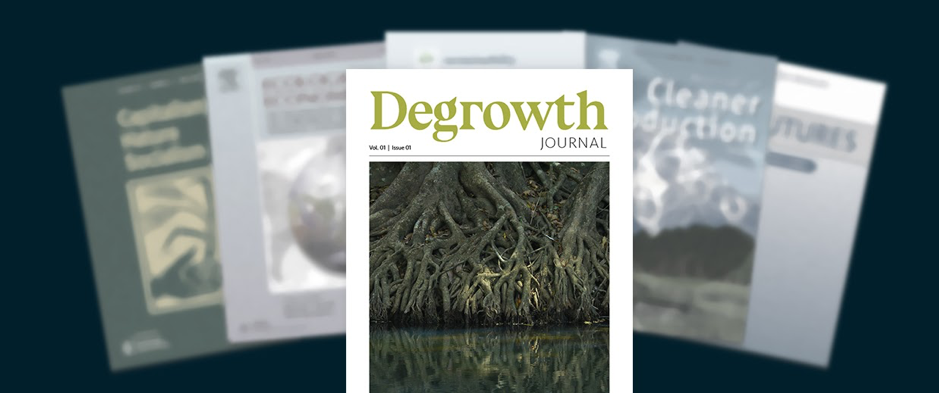This piece will close the ten-part degrowth.info series on strategy, highlighting some of the key insights and charting the development of the strategy debate within degrowth. We will then offer some insights on how our own understanding of strategy and degrowth has changed over the last two years since we first urged the community to engage with this topic more. Finally, we will consider the promising idea of a Degrowth International and offer some potential pathways forward for the degrowth movement.
The blog series on the role of strategy in the degrowth movement was sparked by an initial piece authored by some of us who discussed the topic in 2018 at the degrowth summer school in Barcelona. We were frustrated with the lack of serious consideration in the degrowth movement of the how question. Our thoughts were influenced by critiques from scholars such as Blühdorn, which argued that degrowth did not adequately consider why transformation has not happened so far (and why it seems unlikely to soon). Thus, the title of our original piece which sparked this series attempted to highlight this gap in degrowth thinking: Beyond Visions and Projects: the need for a debate on strategy in the degrowth movement. We argued that degrowth had an excellent analysis of multi-dimensional crisis and was able to offer a desirable utopian alternative, but had been unable to coherently articulate a strategy (or strategies) for bringing this into reality. Furthermore, we argued that there were lingering contradictions and tensions within the degrowth movement in regards to perspectives on transformation, which was one of the reasons this question had been avoided; it risked fracturing the movement. Our overall argument was that it is essential for degrowth to address this question of strategy, with all of its challenges, sooner rather than later. Further, we attempted to stress that this dialogue must be honest, without the naivety that all strategies are equally feasible and effective in all contexts, nor are they all aways compatible (both with each other and with degrowth principles).
At degrowth.info, we organised a ten part strategy series to hear from the degrowth community on this topic. We will summarise just some of the contributions here, to provide a snapshot of the debate. Find details of the entire ten part series here.
In his contribution, Panos Petridis argues that degrowth’s strategic plurality should remain, but he also acknowledges that “this plurality might lead to dispersed, even conflicting, efforts.” He advocates for evaluating strategies based on their emancipatory potential. Notably, he hopes this approach will “bypass the longstanding debates on the role of state versus bottom-up action by focusing instead on subversive strategies”. Jocelyne Sze and Omar Saif argued that the degrowth movement’s dispersed nature, lack of formal structures, and only recently emerging regional actors, mean that the question of who is strategising becomes essential. They argue that “the formulation of a multi-chapter organisation, at the international, national, regional and local levels (operating with a horizontal rather than hierarchical structure) could provide the means to deliver context-specific, co-produced strategies for achieving a degrowth society”. Their text appears to have foreshadowed calls for the formation of a ‘Degrowth International’ at the Degrowth Vienna 2020: strategies for social ecological transformation conference to increase coordination and collaboration across the degrowth movement.
Both Christos Zografos’ piece and Giuseppe Feola’s contribution explore similar points: the extent to which past transformations might be useful for degrowth to learn from, how to account for unexpected outcomes and contingencies when considering strategies, and the risks of thinking in terms of a blueprint for action or deterministic rules. Feola argues that for a fundamental transformation beyond capitalism, which degrowth represents, there is virtually no comparable historical precedent. He suggests that by searching for historical analogies we may actually serve to narrow our perspectives on the possible characteristics of a degrowth transformation.
Barth et al argue for policy instruments that shift the rules of the game in their strategy piece. Echoing Petridis on the importance of considering how strategies interact at different levels, the authors argue that policies may be a significant point of leverage toward a degrowth transition. They contend that while many degrowth scholars advocate for bottom-up responses, such approaches are inadequate to achieve a system level change without support from above. Joël Foramitti’s contribution to the series points to the importance of building counter-institutions to those of the dominant political-economy. While transforming existing institutions from within should not be abandoned, he argues such efforts have often fallen short. Instead, Foramitti writes, “counter-institutions could be designed to gradually shift power back to democratic control, while creating sustainable livelihoods.”
Reflecting on the recurring references to the work of Erik Olin Wright throughout the emerging strategy debate in degrowth - and particularly at the Vienna 2020 conference - Ekaterina Chertkovskaya’s entry in the series assesses in greater depth what degrowth can learn from Wright’s framework of anti-capitalist strategy. Chertkovskaya argues that degrowth needs to combine multiple strategic approaches, reflecting its plurality as a movement. However, she argues for a special emphasis on those which build power outside the capitalist system, and a caution towards those which - in seeking to tame capitalism - may only serve to stabilise it.
In the two years since our original appeal for the degrowth community to engage more directly and thoroughly with the question of strategy, there have been many positive developments and discussions. Most notably, the Vienna 2020 degrowth conference on Strategies for Social Ecological Transformation put this question under the spotlight for perhaps the first time in degrowth’s history. Additionally, Giorgos Kallis and Giacomo D’Alisa published a timely paper highlighting degrowth’s lack of a theory of the state, which is one of the many vital questions within the strategy debate. Added to this, the strategy series on degrowth.info seemingly encouraged many within the degrowth community to engage with this important topic, and we were inspired by the volume and enthusiasm of the responses. Indeed, our experiences of collating the strategy series, organising and participating in the Vienna conference, and informal exchanges on the topic have led to the evolution of our own thinking on strategy.
Now, two years later, overcoming strategic interderminism remains an important task for degrowth research. A key task is to develop tools and methods for assessing the effectiveness of different strategies, given the complexity and uncertainty entailed in transformation processes, long time horizons of change, context-sensitivity, and other factors. Some possible criteria for evaluating strategies have already been proposed, such as by Panos Petridis in this blog series, but further methodological work to operationalise such ideas is exactly one direction we believe the degrowth movement would benefit from pursuing. We believe that the degrowth movement can leverage its now bountiful knowledges and resources to begin more rigorous and systematic assessments of which strategies may be most effective in different places, at different times, and across different sectors.
However, while engaging with the question of strategy, it also became clear that there is currently no body or structures through which to deliberate and coordinate the collective priorities and direction of the degrowth community. In a sense, there is a two-fold consideration of strategy for the degrowth community then. Firstly, the extent to which degrowth research (just one of the community’s activities) critically considers the role of strategy in bringing about its desired transformation of society, and secondly, how the degrowth community should strategically orient itself and which activities it should prioritise (e.g. research, activism, building nowtopias, movement organising, etc).
Notably, this lack of coordinating structures was picked up on at the 2020 Vienna strategy conference, resulting in proposals to establish a Degrowth International. Echoing the concerns of Sze and Saif described above, these calls highlighted the need to delineate spaces or bodies for the degrowth community to deliberate and determine actions on questions of its own strategic orientation. A Degrowth International could provide the structures for this task, perhaps taking the form of decentralised local chapters feeding representatives into national and international assemblies. The creation of such a body will likely hinge however on the question of how far we wish to formalise the degrowth movement.
Such processes of formalisation will undoubtedly (and in many ways justifiably) raise concerns and resistance from some quarters. The degrowth movement prides itself on its plurality, embracing of a diversity of ideologies, and being a big umbrella. As many have pointed out, this is indeed a huge strength of degrowth, which has enabled the flourishing of an emerging movement of activists, researchers and practitioners. The creation of a Degrowth International should not be seen as a threat to the diversity of people and ideas which have come together under the degrowth umbrella, however. Rather, it would attempt to harness these collective capacities more effectively towards transforming society.
Ultimately, whether degrowth is to devote more of its energies towards questions of strategy is unlikely to be a question of capacity but rather of desirability, and again, what shape the degrowth community wishes to take moving forward. On this note, an important initial question to answer is: should degrowth’s centre of gravity remain more weighted towards the academic realm, leaving a dispersed array of grassroots actors to interpret and act on degrowth ideas as they independently choose, or should degrowth seek to coordinate itself as a social movement, and thus expand critical reflections on strategy and organizing for transformation?
In response to this question, we outline here three possible intersecting pathways which degrowth could pursue going forward. On the one hand, we envisage an academic-driven pathway, which we see more or less as an extension of the status quo of the current degrowth community. Alternatively, we also envisage two variants of a more movement-oriented pathway, whereby degrowth could ramp up its strategising for transformation via the creation of a Degrowth International. These three pathways should not be seen as rigid and mutually exclusive. However, given the timelines of ecological crisis that society faces, and the limited capacities of the small degrowth community, it is important to consider which pathway we might prioritise moving forward.
To begin, let’s consider the pathway which is more academic-driven and the least movement-oriented. This pathway probably also requires the least evolution from how the degrowth community has operated over the last decade. The main weight of degrowth would remain focused on producing academic research, while it is hoped that this work goes on to influence the actions and decisions taken by further actors at both the grassroots and policy levels. There are few extra energies put into formalising or harnessing the political power of these actors as a collective, and the vast majority of collaborations across the degrowth community take an academic format, such as conferences, themed journal issues and edited books. With this first pathway then, considerations of strategies for transformation do not go that much further.
Here, however, we are arguing that considerations of strategy and organising for transformation should become greater focuses for the degrowth community. To achieve this means taking a more movement-oriented pathway, and would require the formalisation of structures capable of deliberating the strategic orientation of the community, such as a Degrowth International. We envisage two possible variants of such a movement-oriented pathway. The first would seek explicitly to expand the reach of degrowth thinking and arguments by proliferating degrowth as a frame for action. This would mean striving to bring more and more people and projects to take action under the degrowth banner. This would of course require expanding considerations of strategy, in terms of how to build the size of the degrowth movement and what actions the movement should take in the name of degrowth.
There is also, however, an alternative possibility for degrowth to take a more agile approach. In this third pathway, instead of seeking to expand degrowth as a frame for action, the degrowth movement would remain relatively niche and small in size, yet seek to harness its capacities effectively to connect to and influence the direction of social movements and political projects operating under other banners (e.g. Climate strikes, Extinction Rebellion, Green New Deal). Considerations of strategy are again vital in this pathway, in order to decide for example which movements, projects and institutions degrowth should seek to influence, in order to further degrowth aims via these vehicles.
To reiterate, we do not see these three pathways as fixed and mutually-exclusive, nor are they the only three pathways which could be envisioned for degrowth. Rather, we offer this illustration here in order to demonstrate just some of the possible directions the degrowth community could prioritise moving forward.
We started this blog series with a desire for the degrowth community to talk more about strategy, and the how question. Through the resulting discussions, we have since realised that in order for these considerations of strategy to progress further, the degrowth community would first require a mechanism or body to collectively deliberate its own strategic priorities and orientation. This body could consider whether to prioritise a more academic or more movement-based pathway, and the specific shape these pathways might take.
We believe the degrowth community should invest time and energy into the creation and legitimisation of a Degrowth International, to conduct these processes of collective deliberation. From our experiences in the degrowth movement and discussions with peers, we sense that there is an emerging generation of younger degrowthers with a particular interest in organising, activism, and movement-building, sometimes explicitly in the name of degrowth.
We have therefore reached the conclusion that the degrowth community should prioritize a research agenda with questions of strategy at its center, in tandem with the development of an agile organising body that can incorporate learning from this strategy research and work closely with other movements in order to maximise degrowth’s influence on the direction of society in the coming years.

degrowth.info speaks to Climate Vanguard, the UK-based organisation seeking to radicalise the youth climate movement around ecosocialism.

Unless the future takes a bizarre turn, and humanity is united in one country under the flag of ‘DegrowthTopia’, in which the only ‘enemy’ that remains is the extra-terrestrial, the puzzle of how we relate and interact with those beyond our borders and communities will remain.

Degrowth is a thriving academic field, but one without a home. It can be a struggle to publish degrowth-related articles in the current journal environment. If successful, authors must often surrender the ownership of their work to commercial journals. After more than a decade of degrowth research, and with a growing number of scholars engaged in the field, we believe the time has come to start...